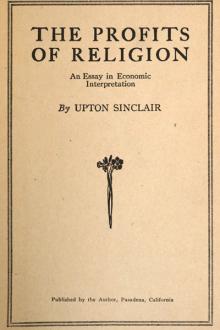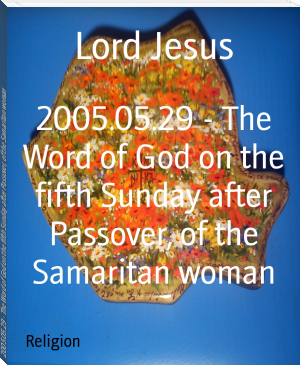The Profits of Religion, Fifth Edition by Upton Sinclair (microsoft ebook reader txt) 📕

- Author: Upton Sinclair
- Performer: -
Book online «The Profits of Religion, Fifth Edition by Upton Sinclair (microsoft ebook reader txt) 📕». Author Upton Sinclair
In every public library in England and many in America you will find an assortment of pamphlets published by these organizations, and scholarly volumes endorsed by them, in which the stock misrepresentations of Socialism are perpetuated. Some of these writings are brutal—setting forth the ethics of exploitation in the manner of the Rev. Thomas Malthus, the English clergyman who supplied for capitalist depredation a basis in pretended natural science. Said this shepherd of Jesus:
A man who is born into a world already possessed, if he cannot get subsistence from his parents, and if society does not Want his labor, has no claim of right to the smallest portion of food, and in fact has no business to be where he is. At Nature's [78] mighty feast there is no cover for him. She tells him to be gone, and will quickly execute her own orders.
Such was the tone of the ruling classes in the nineteenth century; but it was found that for some reason this failed to stop the growth of Socialism, and so in our time the clerical defenders of Privilege have grown subtle and insinuating. They inform us now that they have a deep sympathy with our fundamental purposes; they burn with pity for the poor, and they would really and truly wish happiness to everyone, not merely in Heaven, but right here and now. However, there are so many complications—and so they proceed to set out all the anti-Socialist bug-a-boos. Here for example, is the Rev. James Stalker, D.D., expounding "The Ethics of Jesus," and admonishing us extremists:
Efforts to transfer money and property from one set of hands to another may be inspired by the same passions as have blinded the present holders to their own highest good, and may be accompanied with injustice as extreme as has ever been manifested by the rich and powerful.
And again, the Rev. W. Sanday, D.D., an especially popular clerical author, gives us this sublime utterance of religion on wage-slavery:
The world is full of mysteries, but some clear lines run through them, of which this is one. Where God has been so patient, it is not for us to be impatient.
And again, Professor Robert Flint, of Edinburgh University, a clergyman, author of a big book attacking Socialism, and bringing us back to the faith of our fathers:
The great bulk of human misery is due, not to social arrangements, but to personal vices. [79]
I study Professor Flint's volume in the effort to find just what, if anything, he would have the church do about the evils of our time. I find him praising the sermons of Dr. Westcott, Bishop of Durham, as being the proper sort for clergymen to preach. Bishop Westcott, whether he is talking to a high society congregation, or to one of workingmen, shows "an exquisite sense of knowing always where to stop." So I consulted the Bishop's volume, "The Social Aspects of Christianity" and I see at once why he is popular with the anti-Socialist propagandists—neither I or any other man can possibly discover what he really means, or what he really wants done.
I was fascinated by this Westcott problem; I thought maybe if I kept on the good Bishop's trail, I might in the end find something a plain man could understand; so I got the beautiful two-volume "Life of Brooke Westcott, by his Son"—and there I found an exposition of the social purposes of bishops! In the year 1892 there was a strike in Durham, which is in the coal country; the employers tried to make a cut in wages, and some ten thousand men walked out, and there was a long and bitter struggle, which wrung the episcopal heart. There was much consultation and correspondence on episcopal stationery, and at last the masters and men were got together, with the Bishop as arbitrator, and the dispute was triumphantly settled—how do you suppose? On the basis of a ten per cent reduction in wages!
I know nothing quainter in the history of English graft than the NAIVETÉ with which the Bishop's biographer and son tells the story of this episcopal venture into reality. The prelate came out from the conference [80] "all smiles, and well satisfied with the result of his day's work." As for his followers, they were in ecstacies; they "seized and waltzed one another around on the carriage drive as madly as ever we danced at a flower show ball. Hats and caps are thrown into the air, and we cheer ourselves hoarse." The Bishop proceeds to his palace, and sends one more communication on episcopal stationery—an order to all his clergy to "offer their humble and hearty thanks to God for our happy deliverance from the strife by which the diocese has been long afflicted." Strange to say, there were a few varlets in Durham who did not appreciate the services of the bold Bishop, and one of them wrote and circulated some abusive verses, in which he made reference to the Bishop's comfortable way of life. The biographer then explains that the Bishop was so tender-hearted that he suffered for the horses who drew his episcopal coach, and so ascetic that he would have lived on tea and toast if he had been permitted to. A curious condition in English society, where the Bishop would have lived on tea and toast, but was not permitted to; while the working people, who didn't want to live on tea and toast, were compelled to!
Dead Cats
For more than a hundred years the Anglican clergy have been fighting with every resource at their command the liberal and enlightened men of England who wished to educate the masses of the people. In 1807 the first measure for a national school-system was denounced by the Archbishop of Canterbury as "derogatory to the authority of the Church." As a counter-measure, [81] his supporters established the "National Society for Promoting the Education of the Poor in the Doctrines of the Established Church"; and the founder of the organization, a clergyman, advocated a barn as a good structure for a school, and insisted that the children of the workers "should not be taught beyond their station." In 1840 a Committee of the Privy Council on Education was appointed, but bowed to the will of the Archbishops, setting forth the decree of "their lord-ships" that "the first purpose of all instruction must be the regulation of the thoughts and habits of the children by the doctrine and precepts of revealed religion." In 1850 a bill for secular education was denounced as presenting to the country "a choice between Heaven or Hell, God or the Devil." In 1870, Forster, author of the still unpassed bill, wrote that while the parsons were disputing, the children of the poor were "growing into savages."
As with Education, so with Social Reform. During the struggle to abolish slavery in the British colonies, some enthusiasts endeavored to establish the doctrine that Christian baptism conferred emancipation upon negroes who accepted it; whereupon the Bishop of London laid down the formula of exploitation: "Christianity and the embracing of the gospel do not make the least alteration of civil property."
Gladstone, who was a democrat when he was not religious, spoke of the cultured classes of England:
In almost every one, if not every one, of the greatest political controversies of the last fifty years, whether they affected the franchise, whether they affected commerce, whether they affected religion, whether they affected the bad and abominable institution [82] of slavery, or what subject they touched, these leisured classes, these educated classes, these titled classes have been in the wrong.
The "Great Commoner" did not add "these religious classes ", for he belonged to the religious classes himself; but a study of the record will supply the gap. The Church opposed all the reform measures which Gladstone himself put through. It opposed the Reform Bill of 1832. It opposed all the social reforms of Lord Salisbury. This noble-hearted Englishman complained that at first only a single minister of religion supported him, and to the end only a few. He expressed himself as distressed and puzzled "to find support from infidels and non-professors; opposition or coldness from religionists or declaimers."
And to our own day it has been the same. In 1894 the House of Bishops voted solidly against the Employers' Liability Law. The House of Bishops opposed Home Rule, and beat it; The House of Bishops opposed Womans' Suffrage, and voted against it to the end. Concerning this establishment Lord Salisbury, himself the most devout of Englishmen, used the vivid phrase: "This vast aquarium full of cold-blooded life." He told the Bishops that he would give up preaching to them about ecclesiastical reform, because he knew that they would never begin. Another member of the British aristocracy, the Hon. Geo. Russel, has written of their record and adventures:
They were defenders of absolutism, slavery, and the bloody penal code; they were the resolute opponents of every political or social reform; and they had their reward from the nation outside parliament. The Bishop of Bristol had his palace sacked and burnt; the Bishop of London could not keep an engagement to [83] preach lest the congregation should stone him. The Bishop of Litchfield barely escaped with his life after preaching at St. Bride's, Fleet Street. Archbishop Howley, entering Canterbury for his primary visitation, was insulted, spat upon, and only brought by a circuitous route to the Deanery, amid the execrations of the mob. On the 5th of November the Bishops of Exeter and Winchester were burnt in effigy close to their own palace gates. Archbishop Howley's chaplain complained that a dead cat had been thrown at him, when the Archbishop—a man of apostolic meekness—replied: "You should be thankful that it was not a live one."
The people had reason for this conduct—as you will always find they have, if you take the trouble to inquire. Let me quote another member of the English ruling classes, Mr. Conrad Noel, who gives "an instance, of the procedure of Church and State about this period":
In 1832 six agricultural labourers in South Dorsetshire, led by one of their class, George Loveless, in receipt of 9s. a week each, demanded the 10s. rate of wages usual in the neighbourhood. The result was a reduction to 8s. An appeal was made to the chairman of the local bench, who decided that they must work for whatever their masters chose to pay them. The parson, who had at first promised his help, now turned against them, and the masters promptly reduced the wage to 7s., with a threat of further reduction. Loveless then formed an agricultural union, for which all seven were arrested, treated as convicts, and committed to the assizes. The prison chaplain tried to bully them into submission. The judge determined to convict them, and directed that they should be tried for mutiny under an act of George III, specially passed to deal with the naval mutiny at the Nore. The grand jury were landowners, and the petty jury were farmers; both judge and jury were churchmen of the prevailing type. The judge summed up as follows: "Not for anything that you have done, or that I can prove that you intend to do, but for an example to others I consider it my duty to pass the sentence of [84] seven years' penal transportation across His Majesty's high seas





Comments (0)